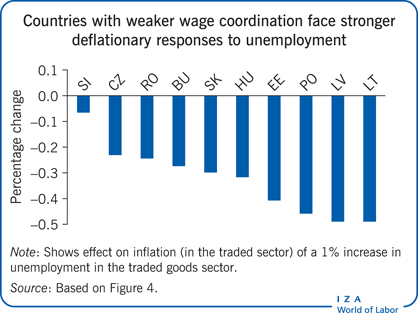Elevator pitch
Aside from employment protection laws, which have been converging, other labor market institutions in new and old EU member states, such as wage bargaining coordination and labor union density, still differ considerably. These labor market institutions also differ among the new EU member states, with the Baltic countries being much more liberal than the others. Research that pools data on old and new EU member states shows that wage coordination mechanisms can improve a country’s macroeconomic performance. Stronger wage coordination and higher union density reduce the response of inflation to the business cycle.

Key findings
Pros
Labor markets are generally perceived to be more flexible in the new EU member states than in the old.
More centralized wage bargaining coordination and higher union density are often associated with lower unemployment.
Wage coordination may result in less sensitivity of inflation to domestic output, thus stabilizing inflation when unemployment is very low.
The benefits of wage coordination may be realized when the lead sectors in wage negotiations are subject to competition through active engagement in international trade.
Cons
Labor markets in the new EU member states offer much less protection to displaced workers than those in old EU member states.
More centralized wage coordination is associated with higher inflation, especially in the traded sector.
Wage coordination may reduce the inflation-dampening effects of higher unemployment during economic downturns.
When the non-traded sectors (which include many service sectors and the public sector) are the de facto leaders in wage negotiations, a country’s competitiveness may suffer.